“We Shall Overcome” is one of those songs you can’t help but respond to. It’s plaintive and powerful. One verse makes you weep while the next exhorts you to shout in defiance.
I have to admit, though, that as much as I love singing this song, it has always made me uncomfortable. Every January when MLK weekend rolls along and my mostly-white choir sings “We Shall Overcome” in my mostly-white church, a part of me feels like an impostor.
I worry that I’m indulging myself by revelling in the song without living the pain that necessitates its singing. It’s an easy way to congratulate myself–“Look how earnestly I sing for civil rights”–without actually having to change anything once the song ends.
Nevertheless, “We Shall Overcome” is one of those songs you mainline; you don’t just hear it, you feel it like a needle rush in your blood. Every year I tamp down the little voice telling me I should examine my motives.
This year, though, when I headed off to our pre-MLK choir practice on Thursday night, I had just listened to the news that the man we elected to live in the White House had called Haiti, El Salvador, and countries in Africa “shitholes” and wished we could have more immigrants from nice [white] places like Norway.
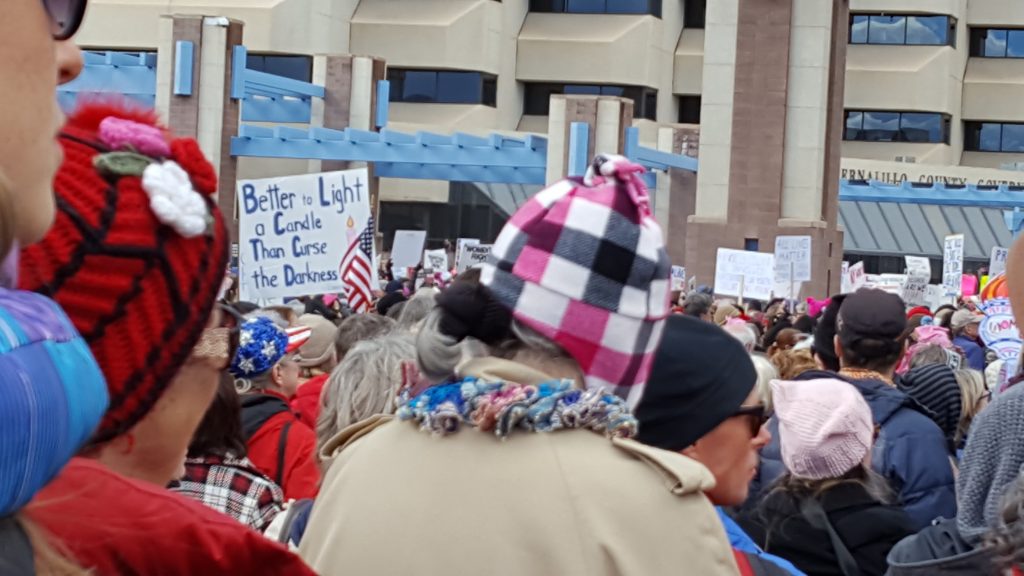
I had also heard that man’s apologists explain that it wasn’t a racist comment, it was code for supporting merit-based immigration. The irony that the second comment was as bad as the first was lost on the man making it.
After we finished singing all the other songs for Sunday, we practiced “We Shall Overcome” to sing while the congregation was gathering. We didn’t talk about the arrangement. Scott launched in on the piano, and then Bob, a tenor whose voice cuts straight through the noise of the world to the quiet of the soul, started singing the first verse. “Deep in my heart, I do believe. We shall overcome, someday.”
On Thursday nights, we practice in the front corner of the church. This time of year it’s already dark when we get there, so no light shines through the stained glass windows. The altar is bare, and most of the lights in the sanctuary are turned off.
Singing at practice is more intimate than singing on Sundays. On the second verse, Margo’s strong alto adds a quiet harmony. “We’ll walk hand in hand,” she sings. The simple concrete floors and wooden pews bear witness.
On the third verse the choir comes in softly, oohing while Margo and Bob remind us that “We shall live in peace someday.”
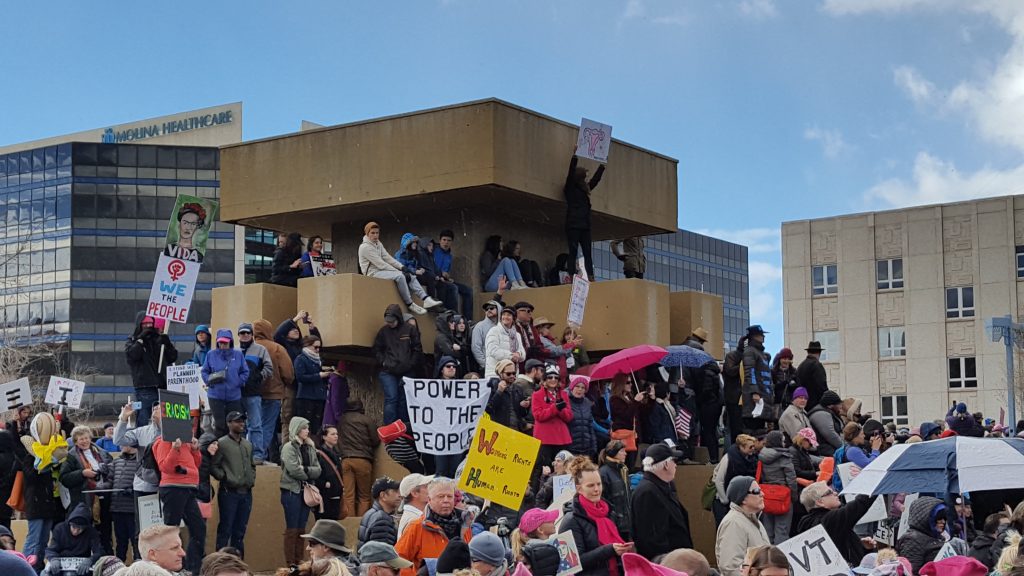
In a May, 2015, essay titled The Surprising History of “We Shall Overcome,” The Atlantic traces the melody to a Beethoven setting of the 1792 hymn “O Sanctissima.” It credits the 1901 lyrics to “the Reverend Charles Albert Tindley, a famed black preacher in Philadelphia,” and tells the story of how the song became a staple of American folk protest music.
We aren’t thinking about that history on Thursday night. On the fourth verse, every voice in the choir comes in singing “We are not afraid.” This verse talks about the present moment–right now. We are not afraid today, we sing; no more waiting for some nebulous someday.
In NPR’s piece on the history of “We Shall Overcome,” Bernice Johnson-Reagon explains how the song evolved. According to NPR, she “was a preacher’s daughter and knew the song as ‘I Will Overcome.’ She recalls the change to ‘We Shall Overcome as a concession that helped bring whites and blacks closer in the civil rights struggle.” I won’t spoil it for you, but her explanation of why “I” expresses the collective will better than “we” is both funny and insightful. (Her explanation of how she accepted the changes to accommodate white people’s needs is neither funny nor surprising.)
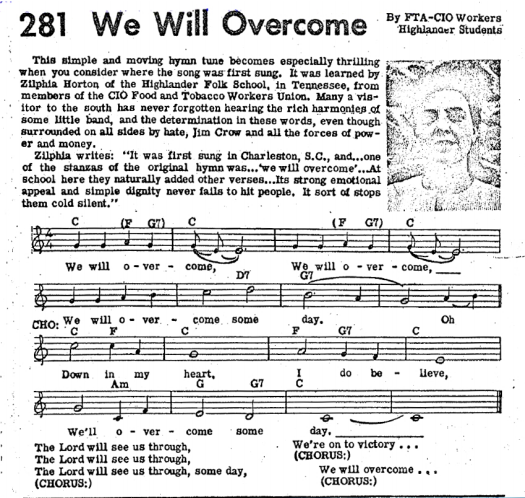
When the instruments took over after the sixth verse, the choir dropped out. As the flute and recorder danced around each other, I was wiping my eyes.
Then Bob came back in with a final, glorious, “We Shall Overcome,” and there was nothing for it but to all join in. Our voices rose in crescendo, filling the empty church before softening into a final “someday.” When the last chord faded we sat in silence, a little stunned by the spirit singing through us.
The NPR piece claims that ” ‘We Shall Overcome’ is not a marching song. It is not necessarily defiant. It is a promise.”
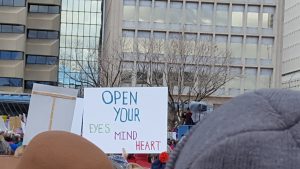
Thursday night, for the first time, I understood it that way. I didn’t hear myself singing “we” as a self-righteous, privileged white woman elbowing my way into an experience I haven’t lived. I heard myself singing “we” in community with other white people who need to get busy overcoming.
I heard myself making a promise.
As I left the church a brisk wind was driving the cold into my coat. I turned the seat warmer to high and cranked the heat. I started thinking about the things white people like me need to overcome if we want to keep this promise, if we want to create a more just society, if we want to move beyond “self-deception and comfortable vanity.”
When we talk about race in my classroom, I tell students about the time I stole a Wii game from Best Buy. My husband and I were buying Dance Dance Revolution for our grandkids. I picked up the game and was carrying it around reading the package (to the unsung writer who creates copy for video game packaging, know that at least one person on the planet is reading your work!).
After we checked out, we walked past security, and the alarm went off. The security guard looked at us, shrugged his shoulders, and waved us through.
When we got in the car my husband handed me the bag with the game. I was puzzled, the way you are when you go upstairs and can’t remember why you went there. I looked at the game I was holding in my hand and realized we had two of them. We had the one we had paid for and the one I’d been carrying around.
I went back into the store and told the guard I had just accidentally stolen the game and handed it to him. He looked confused, but took it from me, and I left.
I draw two conclusions from this story. First, and most obviously, the world has been taught that people who look like my husband and me (white, straight, middle-aged) aren’t thieves. It didn’t matter that the alarm was going off to tell this man that we were, indeed, stealing something. We didn’t look the part so he waved us through.
The second thing I’ve come to realize about the Best Buy story is that I’ve grown up expecting the world to be kind to me. I had no fear associated with returning the video–I would smile and laugh at my foolishness and the guard would understand and smile back and we’d all go on about our business.
When I tell teenagers my story, I’m reminded that those lessons don’t apply to everyone. Every year, my students of color tell me about the time their family was followed around a store, refused service, called names.
This telling is itself an improvement; only recently have my students been willing to share these stories with their white teachers and classmates. We’ve only begun to to admit that what we look like shapes how we live in the world.
And there is still a long way to go. It’s not uncommon for another well-meaning person to jump in to explain those experiences away, to attribute their occurrence to causes other than race. I, too, have to keep learning that the most basic form of respect is to believe what someone tells me about their own experience. I’ve realized it’s a special form of arrogance to believe that I possess more insight into someone’s life than they do.
Thursday night with “We Shall Overcome” still ringing in my ears I drove past the dark field where the cranes feed. When I reached home, this essay was ringing in my ears. The late shows were talking about the shithole comment.
By Sunday morning there were denials, telling silences, a few tepid denunciations. I went to church and sang “We Shall Overcome.” The congregation stood as we sang the final verse, visibly moved.
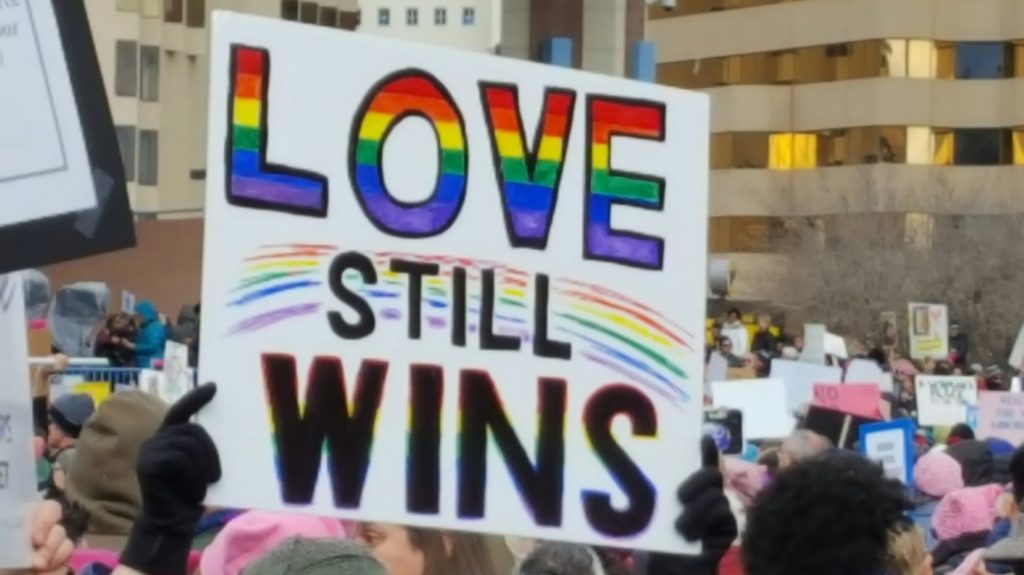
This time, I didn’t feel uncomfortable; I felt empowered.
In a sermon he preached at Dexter Avenue Baptist Church, Martin Luther King called love “the only creative, redemptive, transforming power in the universe.” In an interview with a reporter today, Donald Trump said, “I’m the least racist person you have ever interviewed.”
It’s 2018 and we’ve all got to up our game. Love has its work cut out for it.
+++++++++++++++++


I’m attending a sacred song circle tonight and was researching the lyrics to We Shall Overcome, when I stumbled upon your post. Thank you.
It’s now January 2025 and DJT is again president of the USA. The American people aren’t overcoming far enough. Take to the streets and sing.
Beautiful. Thank you
Heather, I felt the same way after watching “Selma” last night. I need to do more too! We all do. They talked in the movie about needing love to change things and how that’s what eventually changed George Wallace. Keep writing, my friend!
I will! Thank you for reading!!
Sunday was a moving experience. Yes, it’s time to get busy overcoming.
Amen!
Love trumps Hate….. every day. #Doro
Yes!